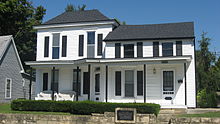Sherman Minton
Sherman "Shay" Minton (October 20, 1890 – April 9, 1965) was an American politician and jurist who served as a U.S. senator from Indiana and later became an associate justice of the Supreme Court of the United States; he was a member of the Democratic Party.
In 1930, after multiple failed election attempts, and serving as a regional leader in the American Legion, he became a utility commissioner under the administration of Paul V. McNutt, Governor of Indiana.
After Roosevelt's death, President Harry S. Truman, who had developed a close friendship with Minton during their time together in the Senate, nominated him to the Supreme Court.
[3]: 41 [2]: 11 He was exposed to politics from an early age: when he was five years old, his father took him to hear a speech by William Jennings Bryan, whom Minton admired for the remainder of his life.
The death was an emotional blow to Minton, and he found it impossible to reconcile with the idea of a loving and just God, leading him to shun organized religion for much of his life.
[2]: 15 To earn money to attend college, Minton resumed working for Swift & Company in Fort Worth and played baseball semi-professionally.
[3]: 48 In September 1911, he enrolled at Indiana University Bloomington, where he participated in a combined program that enabled him to complete both his undergraduate and law degrees in only four years.
At Yale he took a constitutional law seminar with former President and future Chief Justice of the United States William Howard Taft, who is said to have described a paper Minton wrote as one of best ever written at the school.
[citation needed] Minton continued to improve his oratory and debate at Yale; he won the Wayland Club prize for extemporaneous public speaking, and helped organize the university's legal aid society.
His opponent, incumbent Republican Senator Arthur Raymond Robinson, accused Minton of playing "Santa Claus" by trying to give everyone "presents".
[3]: 87 Minton was made a member of a special Lobby Investigation Committee chaired by Senator Hugo Black, that was set up to look into questionable lobbyist groups.
Minton immediately began a full-scale investigation of the media conglomerate controlled by Frank E. Gannett,[3]: 95 accusing him of publishing Republican Party propaganda.
[3]: 96 Gannett, and a large number of allies in newspapers and on radio, immediately began to charge Minton and the Democratic Party with an assault on the freedom of the press.
As he was saying that the money from the corporations was for advertising in the magazine, Minton beat his gavel and yelled, "This committee doesn't intend to permit you to use this as a forum to air your Republican views.
[3]: 109 Minton received a death threat in the form of an envelope containing a shotgun shell and a message advising him to not vote for the court packing plan.
Minton was unhappy with the loss and it cost him considerable support among his voters, but as a result of his close connection with the bill and the leaders of his party, he gained more influence with the Democrats.
He voted in favor of the Smith Act, which made it a crime to advocate the overthrow of the government, a law specifically targeted at communists and fascists in the United States.
[3]: 161 World War II broke out shortly after Minton joined the court, creating a flood of cases in which legal precedent provided little guidance, including challenges to wartime measures, selective service laws, price controls, rationing and civil liberties.
[2]: 113 Minton was described by William Radcliff as a "faithful disciple of judicial restraint," an unexpected development when compared to his overtly partisan political career.
[3]: 181 Other court reporting papers made similar comments, applauding the manner in which he turned complex issues to simple questions that could easily be understood.
[3]: 186 [14] Minton was also in the majority in several cases filed to enforce decisions made by the National Labor Relations Board, usually to end worker strikes.
As indicating how times have changed and how even our coarse nature has yielded to the protecting care of governmental policy, we confess we do not even know a bookmaker, clerical or otherwise, and our passes to the beautiful race tracks around Chicago lie in our desk unused.
"[2]: 111 After Roosevelt's death and Truman's succession to the Presidency, Minton continued offering advice to the new administration on a range of topics, including patronage and political maneuvering.
Truman appointed Minton as head of the War Department Clemency Board, a panel of judges charged with overseeing reviews of decisions made by the courts-martial.
[3]: 19 The Indianapolis Star offered a more sympathetic opinion, pointing out Minton's qualifications and the pride Indiana could take in having a native on the Supreme Court.
[3]: 261 He continued to take a broad view of governmental powers, demonstrated in his dissenting vote in the case of Youngstown Sheet & Tube Co. v. Sawyer, which ruled unconstitutional President Truman's wartime seizure of several steel mills to avert a workers' strike.
[31] Minton voted to uphold anticommunist legislation during the period of the "red scare", siding with the majority in 1951's Dennis v. United States, which upheld the conviction of the leader of the US Communist Party.
[3]: 287 While some writers like Linda Gugin and legal historian William Radcliff have given high praise to Minton's logic in his written opinions, they point out that his positions had little long-term impact.
[3]: 280 Gugin authored a work in rebuttal to Schwartz's harsh critique, saying that Minton's rulings were "predictable based on the principles of deference, precedent, and strict interpretation"; she attributed his poor ranking to the bias of reviewers in favor of judicial activism.
[3]: 308 Linda Gugin and Professor James St. Clair have noted that the federal courts have lost a valuable point of view by not having experienced legislators among their ranks.






